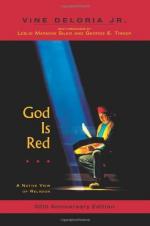
|
| Name: _________________________ | Period: ___________________ |
This test consists of 15 multiple choice questions and 5 short answer questions.
Multiple Choice Questions
1. In Deloria's opinion, how has education affected tribal ways?
(a) Lures many away from reservations.
(b) Encourages tribal culture.
(c) Causes discord among the tribe.
(d) None whatsoever.
2. Deloria encourages cultures outside tribal cultures to do which of the following?
(a) Abandon Christianity.
(b) Observe tribal religious traditions.
(c) Respect sacred places.
(d) Embrace the correlation between religion and nature.
3. How does Deloria believe the Indians felt about the establishment of reservations?
(a) No one told the Indians.
(b) The Indians thought it was a great idea.
(c) The Indians are the ones that came up with the idea of reservations.
(d) The Indians did not like the establishment of reservations.
4. In what manner was it legal for the Europeans to confiscate the Indian land?
(a) By force or purchase.
(b) By purchase only.
(c) No answer is correct.
(d) By force only.
5. In Chapter 10, who is given credit for developing the early idea of the immortality of the soul?
(a) Greeks.
(b) Europeans.
(c) Cherokee.
(d) Romans.
6. Deloria explains that Indians believe that the souls of dead people often remain at the place of their __________,
(a) Wedding.
(b) Birth.
(c) Funeral.
(d) Death.
7. In Chapter 14, Deloria saw one advantage of reservations as which of the following?
(a) No one bothered them.
(b) They had their own schools and hospitals.
(c) They were able to practice their own religion.
(d) It kept outsiders away from the Indians.
8. According to Deloria, how did outside influences affect tribal religion?
(a) Tribal religion was not affected in any way.
(b) Many Indians converted to Christianity.
(c) Many Indians were confused.
(d) Tribal religion basically disappeared.
9. By the 1500's, Deloria claims it was popularly accepted that the Indians could live on their natural land, until which of the following took place?
(a) Such time as the invading Europeans need the land for themselves.
(b) The older generation died.
(c) The turn of the century.
(d) They disobeyed the Europeans in any way.
10. According to Deloria, in American Indian tribal religions there is a noticeable absence of which of the following?
(a) The fear of death.
(b) Baptisms.
(c) Cemetaries.
(d) Life after death beliefs.
11. Deloria claims that religion dominates a tribal culture and which of the following?
(a) Ceremonial activities are not political.
(b) Political activity and religious activity are intertwined.
(c) Political activity and religious activity are always clearly defined.
(d) Political activity is less important.
12. As a criticism of Christian history, Deloria quotes Arnold Toynbee, saying the difficulty is that of viewing a map of the Mediterranean and _________________________.
(a) Pretending it is a map of heaven.
(b) No answer is correct.
(c) Thinking it is in North America.
(d) Pretending it is a map of the world.
13. Why have many people returned to the reservation according to Deloria?
(a) To lean rain dances.
(b) To be healed from ailments.
(c) They missed their families.
(d) To attend new universities.
14. The title of Chapter Ten is "___________ and Religion."
(a) Indians.
(b) Christians.
(c) Life.
(d) Death.
15. Deloria believes that Western commercial interests and Christianity have gone hand in hand to do which of the following?
(a) Destroy nations of the world for trade and conversion.
(b) Unite Indian tribes worldwide.
(c) Modernize the world.
(d) Annihilate anyone that disagrees with them.
Short Answer Questions
1. Deloria explains that the Amish relate land, community, and religion into _____________________.
2. Deloria believes tribal religions did not consider life after death _________________.
3. In Chapter 17, Deloria ponders whether old tribal religions can do which of the following?
4. In Chapter 14, Deloria expresses concern about the ongoing tug-of-war between the old tribal culture and ________________________.
5. According to Deloria in Chapter 11, what Christian community is admired by countless followers of Indian religions?
|
This section contains 617 words (approx. 3 pages at 300 words per page) |

|




